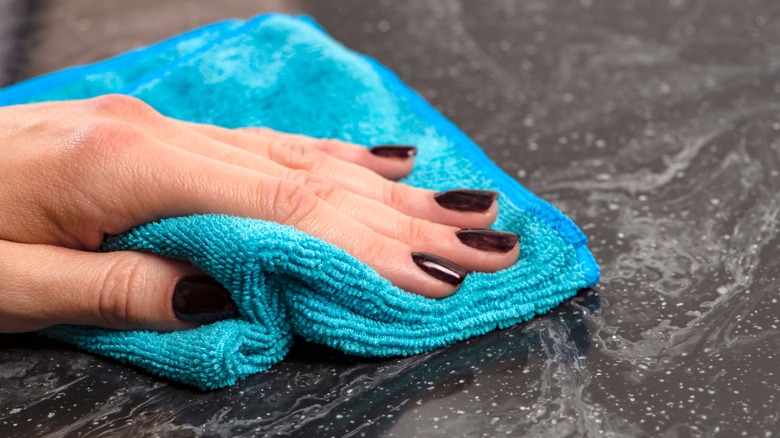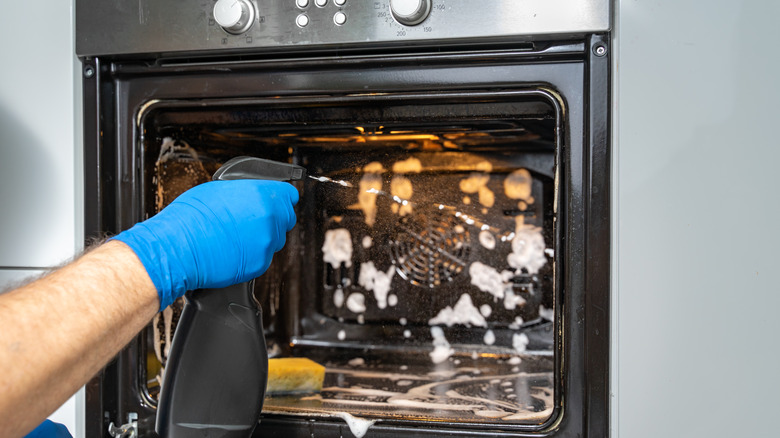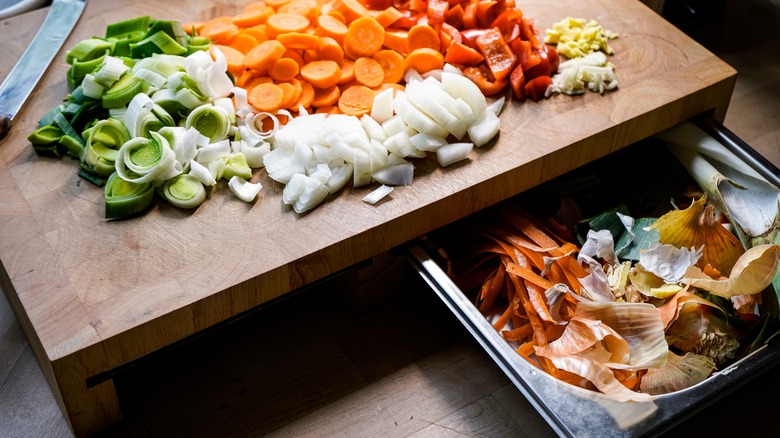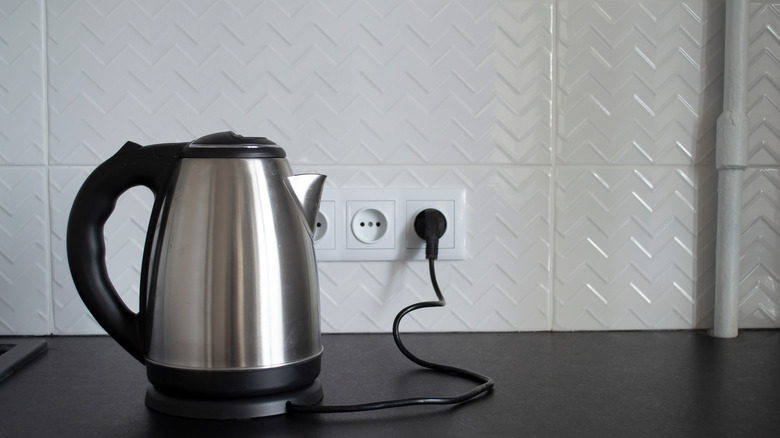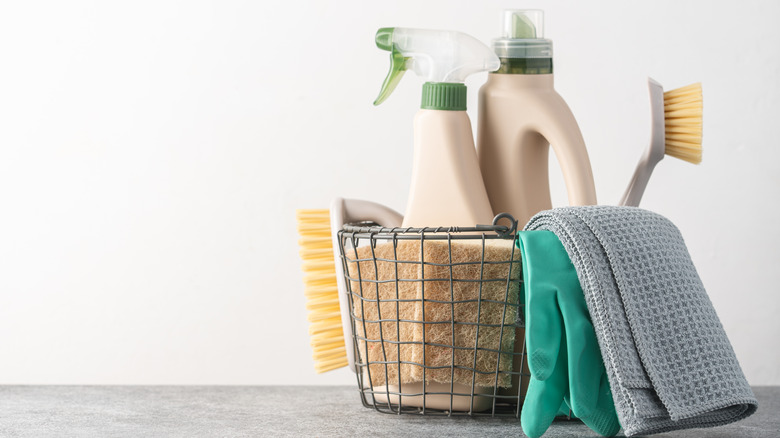Five Things That Will Make Cleaning Your Kitchen A Breeze
When opting to tackle household duties, you might choose the kitchen over the bathroom, thinking it's an easier job — but you would be wrong. The kitchen is actually the dirtiest room in the home (via The Spruce). It's not surprising, since the kitchen is the site where raw meat and fish are handled on a regular basis. It also houses food leftovers and old food scraps that can grow pathogens. On top of that, the whole family — including children and pets — come in and out all day, touching and contaminating surfaces.
Microbiologist Dr. Charles Gerba, fittingly known as Dr. Germ, says "There's more E. coli in a kitchen sink than in a toilet after you flush it," (via Food & Wine). He explains that "The sink is a great place for E. coli to live and grow since it's wet and moist."
Yet, while the kitchen requires a lot of regular upkeep, there are simple tips to make cleaning it easier.
Don't put off daily clean-up
There are many moving pieces to kitchen duties, from counters and sinks to dirty dishes and appliances. The best thing you can do to keep it clean (and also prevent you from having to do a bigger and more massive decontamination job) is to sanitize it daily (via How to Simplify).
First off, make it a habit to do a quick run-through of musts before you go to bed. Make sure no dishes remain in the sink overnight. Put away any pantry items used in cooking that day and wipe down the counters. Put out the garbage so raw food items don't stay in your kitchen overnight.
If you want to go a step further, employ the clean-as-you-go method (via The Kitchn). Once the food is in the oven, use that time to rinse over the dishes and load the dishwasher or scrub the sink and wash countertops. You'll be glad you did when it comes time for that last check before bed.
Make regular plans to deep clean appliances
While cleaning up surfaces in your kitchen is a daily requirement, you should also plan to devote time to do some deeper cleaning of large appliances. Once a month you should deep clean, inside and out, your refrigerator, dishwasher, and stove (via NBC News).
Even though refrigerators are kept at a cold temperature, some bacteria (like listeria) thrive in that environment.
Similarly, while stoves reach intensely high temperatures, they also can harbor pathogens. Microbiologist, Philip Tierno Jr., Ph.D, says "Stoves tend to be somewhat neglected. Splatters or spills of food that aren't promptly cleaned up can become a good medium for the growth of microbes."
Dishwashers are another big offender, as bacteria often get trapped in the seal.
With microwaves, food can splatter along the sides and top and stay there until the next use. At that point, the food remnants will then get reheated and can literally drop off into the food you are heating up (via Vice). Dirty microwaves can make you sick, so aim to clean your microwave once a week.
Designate a spot for food scraps and utensils
Anyone who has ever cooked knows that the prep is the messiest part, so get organized before you even begin. The Pioneer Woman recommends keeping a compost bowl on your sink. Then, when you're chopping vegetables or meat, you can add the scraps to the bowl rather than tossing them to the side, further dirtying the counter. Loose scraps left on the counter enable bacteria to spread. They will often also leak juice, which can trickle down the counters, under other dishes and appliances, and even onto the floor.
If you don't have (or want) a compost bowl, you can just as easily set up a small plastic bag on the counter to do the job. Then simply throw it out when meal prep is done.
Another lifesaver is a spoon rest. You should never take a spoon or spatula that has caked-on food or sauce on it and lay it on the bare counter. Not only is that opening it up to bacteria, but it's making another mess for you to clean up later (via Gear Patrol). If you don't have a spoon rest, fold up a piece of paper towel or use a small plate.
Eliminate clutter on your counters to keep germs away
Though you may have fabulous canisters, china, and dinnerware, keeping them on your countertops is not ideal. This goes far beyond the visual display that having too many things on your counters simply looks cluttered. There is a far more practical reason.
Stephanie Cooper of Energy Cleaning tells Reader's Digest, "From a cleaner's point of view, it is a nightmare to properly wipe each thing every week." Also, since food preparation is messy, and spills and splatters happen on a regular basis, you'll have to clean whatever is kept on your counters every time there is a mess.
In addition, these items gather dust. Cooper says. "From a health perspective, it is not advisable to keep dusty objects near the place you prepare your food or eat."
This advice also goes for cutting boards, mugs, knives, and storage containers (via Apartment Therapy). However, some things that should be kept on the counters are small appliances that are regularly used and easy to wipe down, like a tea kettle or coffee pot.
Keep vital cleaning staples stocked and organized
With all of the cleaning you'll be doing in the kitchen, keeping stocked up on useful cleaning supplies is non-negotiable. These include a good oven cleaner, a dishwasher cleaner, a disinfectant designed for use in a kitchen, an all-purpose cleaner, microfiber cleaning cloths, and a good mop and bucket (via Insider).
Other handy cleaning items include stainless steel wipes, disinfectant wipes, and a bristled cleaning brush (via Mashed).
Once you have the basic necessary staples, you don't need to keep buying anymore. Having overfilled cabinets will only prevent you from quickly reaching what you need when you grab a cleaner.
In addition, cleaners don't last forever, so you do need to keep an eye on expiration dates. Brian Sansoni, of the American Cleaning Institute, tells Real Simple, "Like many products purchased at the grocery store, cleaning products can degrade over time." Once products reach their expiration date, they may be less effective and they also may damage surfaces.

